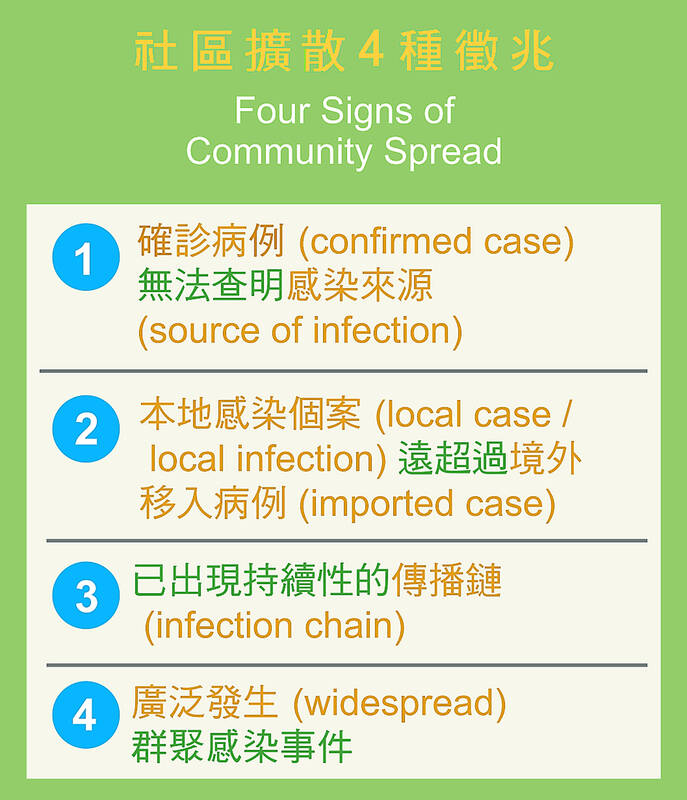2020 年 4 月 6 日媒體報導 〈連假後憂爆第三波疫情 醫師提醒出門最需擔心「隱性感染者」〉,側面反映出防疫最大的威脅之一就是所謂的「隱性感染者」。「隱性感染」英文是 subclinical infection/inapparent infection/silent infection,「隱性感染者」則是 subclinical infected person,其實就是「無症狀帶原者」 (asymptomatic carrier)。Asymptomatic 是 showing no symptoms 的意思。
在討論疫情傳播途徑時,「接觸傳播」是 contact transmission,「飛沫傳播」是 droplet transmission,「空氣傳播」是 airborne transmission,「社區傳播」是community transmission,「社區擴散」是 community spread,「局部傳播」是 local transmission。
此外,「群聚感染」英文是 cluster infection,「院內感染」是 hospital-acquired infection/nosocomial infection。

Photo/Graphic courtesy of Bookman 圖片:書林
台灣第 19 例新冠肺炎確診病例是名「白牌車」(unlicensed taxi) 司機,陳時中部長特別說明這個病例可算是「*社區感染」,不是「社區傳播」。陳部長說明社區傳播的特性是:「在社區中走動都會被感染」。它具有四個徵兆:
1. 確診病例無法找到傳染來源;
2. 本地感染個案數已遠超過境外移入感染個案數;
3. 已經出現持續性的傳播鏈;
4. 有廣泛發生的群聚感染 (cluster infection) 事件。
部長提到的兩個名詞在英文中應該是 local transmission 和 community spread,嚴格來講,中文應該說「局部傳播」與「社區傳播」或「社區擴散」,語意上會較為清楚。我們醫衛系統使用的「社區感染」譯自英文 local transmission,但從中文字面,很容易與「社區傳播」(community transmission) 混淆。根據伊利諾州醫衛部對 local transmission 的解釋:Limited local confirmed transmission is defined as a single, locally acquired case, or cases clustered in a single household or nearby houses,它的意思是「只侷限在一家或附近幾家的很小範圍內感染」。在醫學上,身體的「局部感染」英文叫 local infection。因此 local transmission 一詞宜譯為「局部傳播」、「侷限傳播」或「有限度感染」,會比「社區感染」清楚。
國家教育研究院雙語審譯會 2020 年 4 月份開會決議,將 local transmission 譯為「局部傳播」,將 community spread 譯為「社區擴散」。
文章由書林出版公司提供:
www.bookman.com.tw
蘇正隆 — 台灣翻譯學學會前理事長、師大翻譯研究所兼任副教授; 編著《英語的對與錯》,《世紀病毒:必讀防疫英文知識與詞彙》...等

In an effort to fight phone scams, British mobile phone company O2 has introduced Daisy, an AI designed to engage phone con artists in time-wasting conversations. Daisy is portrayed as a kindly British granny, exploiting scammers’ tendency to target the elderly. Her voice, based on a real grandmother’s for authenticity, adds to her credibility in the role. “O2” has distributed several dedicated phone numbers online to direct scammers to Daisy instead of actual customers. When Daisy receives a call, she translates the scammers’ spoken words into text and then responds to them accordingly through a text-to-speech system. Remarkably, Daisy

Bilingual Story is a fictionalized account. 雙語故事部分內容純屬虛構。 Emma had reviewed 41 resumes that morning. While the ATS screened out 288 unqualified, she screened for AI slop. She could spot it a mile away. She muttered AI buzzwords like curses under her breath. “Team player.” “Results-driven.” “Stakeholder alignment.” “Leveraging core competencies.” Each resume reeked of AI modeling: a cemetery of cliches, tombstones of personality. AI wasn’t just changing hiring. It was draining the humanity from it. Then she found it: a plain PDF cover letter. No template. No design flourishes. The first line read: “I once tried to automate my

Every May 1, Hawaii comes alive with Lei Day, a festival celebrating the rich culture and spirit of the islands. Initiated in 1927 by the poet Don Blanding, Lei Day began as a tribute to the Hawaiian custom of making and wearing leis. The idea was quickly adopted and officially recognized as a holiday in 1929, and leis have since become a symbol of local pride and cultural preservation. In Hawaiian culture, leis are more than decorative garlands made from flowers, shells or feathers. For Hawaiians, giving a lei is as natural as saying “aloha.” It shows love and

1. 他走出門,左右看一下,就過了馬路。 ˇ He walked outside, looked left and right, and crossed the road. χ He walked outside and looked left and right, crossed the road. 註︰並列連接詞 and 在這句中連接三個述語。一般的結構是 x, y, and z。x and y and z 是加強語氣的結構,x and y, z 則不可以。 2. 他們知道自己的弱點以及如何趕上其他競爭者。 ˇ They saw where their weak points lay and how they could catch up with the other competitors. χ They saw where their weak points lay and how to catch up with the other competitors. 註:and 一般連接同等成分,結構相等的單詞、片語或子句。誤句中 and 的前面是子句,後面是不定詞片語,不能用 and 連接,必須把不定詞片語改為子句,and 前後的結構才相等。 3. 她坐上計程車,直接到機場。 ˇ She took a cab, which took her straight to the airport. ˇ She took a cab and it took her straight